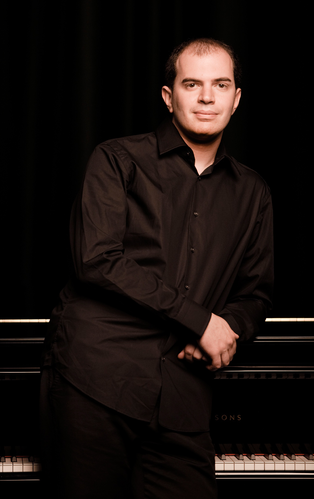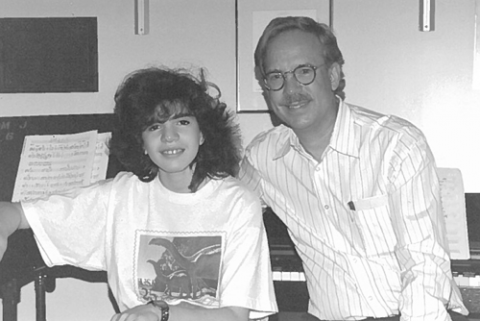Alumni Profile: Kirill Gerstein '96

Kirill Gerstein
Photo by Marco Borggreve

A young Kirill Gerstein with professor Gary Burton.
Photo provided by the artist
Aspiring rock stars may believe that a hit single is the only path to music industry riches, but Kirill Gerstein '96 knows otherwise. The Russian-born classical pianist wasn't striving for a hit or anything else in particular; he was simply enjoying traveling the world and playing music he loved. But one day earlier this year, the riches found him. He arrived at a meeting and was told that he had won the $300,000 Gilmore Artist Award, an elite prize that goes to a deserving pianist once every four years. Who needs the Billboard charts, anyway?
Stunning accomplishment has long marked Gerstein's career; he was winning major contests in Europe before reaching his teens. After catching the attention of Berklee officials, he decided to pursue his other passion in music—jazz—and, at 14, became one of the youngest-ever matriculating students in Berklee's history. He studied with Gary Burton, Phil Wilson, Ray Santisi, John Bavicchi, and others, but after several years of immersion in jazz, Gerstein turned his focus back to classical. He has since become one of the world's preeminent concert pianists. The following is a condensed and edited transcript of our conversation.
You play about 100 shows per year, most of them as a solo artist. How is life on the road?
It's quite a lonely life, being a classical pianist. It's quite different than touring with a jazz group, with a bunch of people that hopefully have a close connection with each other. What is nice is I have a lot of friends in many places that I go to and some friend will come along for a couple of concerts.
What are the keys to surviving life on the road?
Well, when I end up in front of the piano, in front of the orchestra and the public, I love that. It makes it easier to take a hotel that's not ideal or tolerate the inconvenience of travel. Ultimately I feel it's worth it because I get to do this absolutely joyous thing for me and on top of it I get paid for it. Additionally, I think it's a great privilege to travel. It's a growth opportunity to meet new and interesting people all the time, to be in different situations, to eat different food, and to see different sites. This nonrepetitiveness is very stimulating for me.
When you're playing music from the classical repertoire, how do you put your own stamp on it?
Well, first of all, by not worrying if I'm going to put my own stamp on it or not. I would compare the process in many ways to feeling in the dark. You have this text—a classical piece is an organism, an animal that you don't yet know. It is very ambiguous. How loud, the what and when is only vaguely noted. What the text means and how the text gets interpreted and read and ultimately transmitted to the listener is very much about freedom and what one can say improvising on the spot. I compare it to reciting a Shakespeare monologue.
Slowly I try to find a way in which the piece makes sense to me, and it's not a sense that's translatable into words. But in an audible way, it's possible to follow its narrative. That also changes from day to day.
After all of your classical training, what was it like attending Berklee?
It was wonderful that all of my ensemble classes by default implied that the teacher would take part and play. Often in an ensemble at a classical conservatory, it means the teacher sits there and gives suggestions to the students. But this experience of playing live with people that are much more experienced is incredibly useful.
Berklee has incredible courses in classical music, in composition and analysis. There's courses I didn't have anywhere else afterward. Courses I took with John Bavicchi were amazing. [We studied] string quartets of Beethoven or Bartok's chamber music.
What made the classes so incredible?
My simple answer is the teachers were very good. John [Bavicchi] for example was a brilliant teacher. My theory about it is that these classical guys that found a place at Berklee were allowed to roam in their mental journeys and were not forced into, "Well, you have to teach third-year classical harmony," or whatever. It seems to me they were allowed to say, "I think it would be cool and it would be interesting for me to teach Bartok string quartets for a semester."
How did that exposure to jazz influence you when you turned your attention back to classical music?
I think in every way. It developed my sense of harmony and timing and, most importantly, the experience of what it means to take a completely different turn. The freedom of the moment that's not set in stone. I had the experience of smelling that other aspect of the creative process—improvising.
When you practice these days, do you ever spend time playing jazz?
I do. Usually when I take a break from practicing classical repertoire, I play around with some jazz chords and jazz sounds. After about three, three-and-a-half years at Berklee I think I was oversaturated with jazz and couldn't do either as well as I wanted. Since I was oversaturated with jazz and missed classical more, that's the direction I went in. But now I would like to find the time to explore the jazz side again and to possibly try to illuminate connections between classical and jazz.
What will you do with the Gilmore prize money?
I haven't decided. It's a wonderful invitation and challenge. One of the things is to think about commissioning a living composer for a piece of some kind. Also on my mind are some collaboration projects, possibly with jazz musicians and classical music to show how close the two are. And also the Gilmore people are very supportive as far as doing things just to develop myself artistically. Including, to just say, "I want to go and take lessons with Gary [Burton] again."
What advice do you have for young musicians hoping to build a career that looks something like yours?
I would suggest that the word career is very dangerous. My suggestion would be to aim for a life in music. That can very well end up being a successful career. But being involved with music is so much more than a career choice. It's something that gives you enough joy that you can't be without it. It's very important to have ambition, but I make sure that I don't forget the true reasons why I do it: this very simple and profound joy of making musical noises in front of people and for people.
